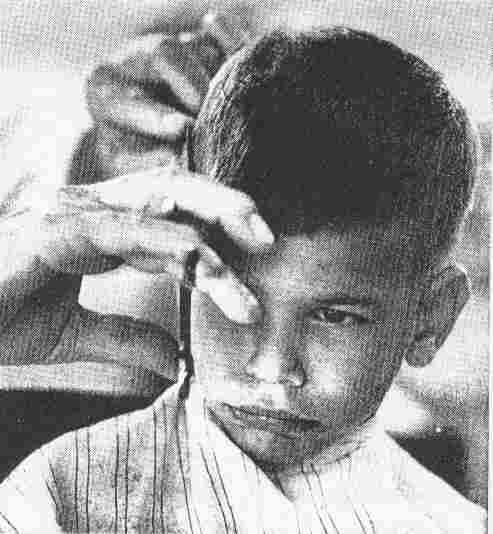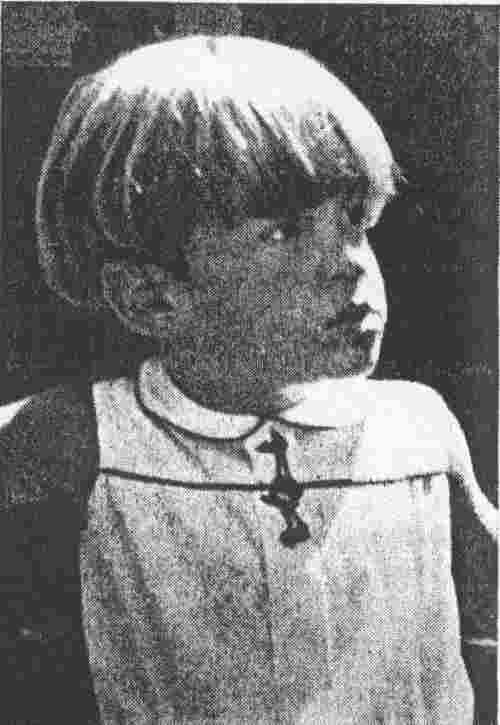
Figure 1.--Many boys didn't like long hair when their mothers insisted on it. Times had changed by the 1960s. John like his longish mop, but the other boys teased him about it. John finally had to have his hair cut, but he didn't like the idea.

Note: An HBC contributor has provided the following article publihed in May 1963.
The line has been drawn. I mean that dangle of hair which recent news photographs show little John F. Ken-nedy Jr. wearing over his 21/2-year-old brows and ears. I don't think even the Kennedys will be able to popularize that haircut with the great American public. I know.
My own son, John, who's still 5, wore his hair that way all through the ages of 2, 3, 4, and even a short while after his 5th birthday. He loved it. He used to stand in front of the mirror and admire his long locks. He hated to go to the barber. His mother had to cut his hair because he insisted pro-fessional barbers didn't do it right. Besides, barbers always wanted to give him a butch, and John would have no part of a butch.
His long cut was fine as long as we lived in New York City. If a boy has long hair there, nobody pays much attention. There are lots of other boys who wear it that way and people don't stop them on the street and ask, "What's your name, little girl?"
But when you move out of Man-hattan to a place like Miami, you're asking for trouble. John's long hair seemed to constitute all open invita-tion for complete strangers to ponder the psyches and even the national ori-gins of his parents.
"What are you?" a woman in a su-permarket bristled to my wife, "For-eign or something?"
Little John had to put up with a great deal more than annoying ques-tions. The boys in school pulled his hair and called him a girl. It made no difference that he could lick any two of his own weight. It made no dif-ference that at a birthday party lie could gobble up more ice cream and cake and break more presents than any one else. It made no difference that he liked his hair that way. His image was cast by that flowerpot hair- cut which dangled over his brow, and he suffered for it.
The birthday party routine be-carne farniliar. Boys in plaid shorts and miniature button-down shirts, with heads trimmed down to the ubiq-uitous crew cut, ganged up on John.
"Ged ouda here, John," they would tell him. "Go play with the girls. You're a girl. You're a girl. You got long hair like a girl. Ged ouda here, John
"I won't get oud," was John's usual reply. I'm a boy, not a girl. And then the fight would begin.
Sometimes mothers put an end to it by sending John off to play with the girls, but pretty soon he would escape back to the boys and the fights would begin all over again. By the time his mother arrived to pick him up, his long hair was unkempt, his eyes were red and his shirt torn.
"Aren't I a boy, mummy?" John would ask.
"Of course you are," she'd reply. "You're a boy and my hero. But whatever happened to you?"
And John would launch into a long, detailed account of who bad punched him in the nose and whom he had tackled and which little boy had called him what name. All his stories ended: "They cried, but I didn't. I'm a big boy."
After a few such episodes-and a few more curbside confrontations between John's mother and people she'd never met--we held a family council to debate what should be done. If only my wife and I had been involved, I think we would have said, "Keep it long and let the busybodies be damned." But it wasn't that way, of course, and in the end we left it up to John.
John understood the problem exactly. But he was even more determined to wear his hair the way he wanted to than we were not to be pushed around by public opinion. He said he liked his hair the way it was and didn't want a butch under any circumstances. And he corrected his sister who had said it was cute the way it was. "It's not," he said, "Its beautiful." So we stood with the long hair.
Then, late last winter, John went to one more birthday party. He wore a new suit that he had been given for Christmas, his shoes were shined an he looked as though he had just stepped out of some kids' fashion advertisement. But no sooner had opened the door of the party house than an elderly woman, who turned out to be the birthday boy's grandmother, stepped up to John.
"You go and play with the girls little boy," she snapped. "I've heard about you, and as long as your mother insists on your going about like that, you've got to play with girls."
My wife was furious. "Why should John have to look just like else?" she said. "What right have you to pick on a little, boy?"
By this time John was down among the boys, and the fisticuffs and the screams were soon underway. His mother extracted him from the melee and led him out of the house by the hand. "But they didn't hurt me," said John as they marched to the car.

Figure 2.--Hair styles were changing in the mid-1960s. A young John F. Kennedy was one of the first boys to appear with longish hair which was soon to be very fashionable. |
Next day a delegation of mothers came to see my wife Anne. She was being cruel to our son, they told her. That kind of haircut might be OK, but the boys didn't like it and it created trouble. Politely-though she was near tears-Anne stuck by her guns and told the committee where they could go. But the invitations to parties for John ceased and the invitations to play came to a halt. John was, in effect, ostracized.
Once again we held a council over John's hair. This time my wife was for cutting it. She'd had enough. John's sister was fir cutting it to. John was for keeping it long, just as it was. I favored letting it remain long, but not quite over his eyes. At that juncture, with the issue unresolved, I had to go away on a trip. When I got back, John's long hair was gone. He had a compromise haircut, neither a crew cut nor a long cut.
My wife didn't like it. John's sister didn't like it. I didn't like it. John hated it. But everyone else thought it was just fine. He was back on the invitation list and nobody bulled his hair and no one called him a girl. And Anne could go to the supermarket without having to account to anybody for anything.
Although it won't matter much for my John, who's finally become used to his newm shorter mop, I wish your Kennedy luck in winning acceptance for long hair. He might just do it. After all, who would dare tell a Kennedy to go get his hair cut?
Reader note: The ultimate irony of this story, published in Late May of 1963,
is that only 8 months later the "Beatles Invasion" was to make made longish hair like John's the norm for boys.
Navigate the Boys' Historical Clothing Web Site:
[Return to Main United States page]
[Return to Main long hair page]
[Introduction]
[Activities]
[Bibliographies]
[Biographies]
[Chronology]
[Clothing styles]
[Essays]
[Countries]
[Contributions]
[FAQs]
[Glossaries]
[Satellite sites]
[Boys' Clothing Home]
